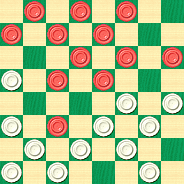The Checker Maven
Jump to navigationTrouble In The Old Fourteenth

From time to time, we like to recall a classic position, one that in a way is like excellent brandy. If you've experienced it before, you will anticipate the fine flavor and be glad to enjoy it again; and if you haven't previously had the pleasure, you're in for a sophisticated and memorable treat.
Today, we're bringing back a trap in the popular go-as-you-please Old Fourteenth opening, said opening so-named simply because it was the fourteenth item in early editions in the ancient and venerable checker books of Payne and Sturges. Here's a run-up to the position of interest:
11-15 23-19 8-11 22-17 4-8 17-13 15-18 24-20 11-15 28-24 8-11 26-23---A 9-14---B 31-26 18-22?
A---25-22 might be considered the main line but this move is perfectly sound.
B---3-8 also draws.
The situation now looks this way:

WHITE
White to Play and Win
B:W20,14,13,12,10,9,8,7,6,4,3,1:B32,31,30,28,27,26,23,22,21,19,18,11.
Over the board, and without your computer or your opening books, can you find the line of play that wins for White? Can you correct Black's losing move? We're guessing that the more experienced readers will find their way here, but for the rest of us, it could be a bit of a challenge.
No matter where you stand, you can uncap the solution and drink deeply of traditional checker knowledge by clicking on Read More.![]()
Solution
25-9* 5-14 29-25 15-18---C 26-22 3-8---D 22-15 11-18 32-28* 8-11 21-17 White Wins.
C---11-16 20-11 7-16 26-22 White Wins.
D---11-15 32-28 White Wins.
Black, instead of 18-22, should have played 6-9 to draw. (11-16 is probably a narrow draw; 5-9 is substantially weaker without necessarily losing. 14-17 loses to 21-14. Thanks to Jim Dobie for catching a typo in our original solution and for providing additional insight.)
You can email the Webmaster with comments on this article.
